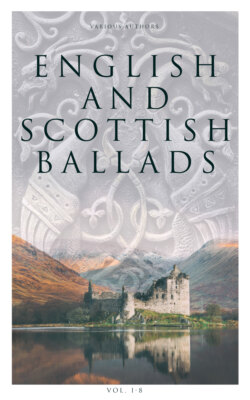Читать книгу English and Scottish Ballads (Vol. 1-8) - Various Authors - Страница 98
На сайте Литреса книга снята с продажи.
Ritson's Ancient Songs, ii. 44.
ОглавлениеA Mery Ballet of the Hathorne Tre, from a MS. in the Cotton Library, Vespasian, A. xxv. The MS. has "G. Peele" appended to it, but in a hand more modern than the ballad. Mr. Dyce, with very good reason, "doubts" whether Peele is the author of the ballad, but has printed it, Peele's Works, ii. 256. It is given also by Evans, i. 342, and partly in Chappell's Popular Music, i. 64.
The true character of this piece would never be suspected by one reading it in English. The same is true of the German, where the ballad is very common, and much prettier than in English, e.g. Das Mädchen und die Hasel, Das Mädchen und der Sagebaum, Erk's Liederhort, No. 33, five copies; Hoffmann, Schlesische Volkslieder, No. 100, three copies, etc. In Danish and Swedish we find a circumstantial story: Jomfruen i Linden, Grundtvig, No. 66; Linden, Svenska Folkvisor, No. 87. The tree is an enchanted damsel, one of eleven children transformed by a step-mother into various less troublesome things, and the spell can be removed only by a kiss from the king's son. By the intervention of the maiden, this rite is performed, and the beautiful linden is changed to as beautiful a young woman, who of course becomes the prince's bride. A Wendish ballad resembling the German is given by Haupt and Schmaler, and ballads akin to the Danish, are found in Slovensk and Lithuanian (see Grundtvig).
It was a maide of my countrè,
As she came by a hathorne-tre,
As full of flowers as might be seen,
'She' merveld to se the tree so grene.
5 At last she asked of this tre,
"Howe came this freshness unto the,
And every branche so faire and cleane?
I mervaile that you growe so grene."
The tre 'made' answere by and by:
10 "I have good causse to growe triumphantly;
The swetest dewe that ever be sene
Doth fall on me to kepe me grene."
"Yea," quoth the maid, "but where you growe,
You stande at hande for every blowe;
15 Of every man for to be seen;
I mervaile that you growe so grene."
"Though many one take flowers from me,
And manye a branche out of my tre,
I have suche store they wyll not be sene,
20 For more and more my 'twegges' growe grene."
"But howe and they chaunce to cut the downe,
And carry thie braunches into the towne?
Then will they never no more be sene
To growe againe so freshe and grene."
25 "Though that you do, yt ys no boote;
Althoughe they cut me to the roote,
Next yere againe I will be sene
To bude my branches freshe and grene.
"And you, faire maide, canne not do so;
30 For yf you let youre maid-hode goe,
Then will yt never no more be sene,
As I with my braunches can growe grene."
The maide wyth that beganne to blushe,
And turned her from the hathorne-bushe;
35 She though[t]e herselffe so faire and clene,
Her bewtie styll would ever growe grene.
Whan that she harde this marvelous dowbte,
She wandered styll then all aboute,
Suspecting still what she would wene,
40 Her maid-heade lost would never be seen.
Wyth many a sighe, she went her waye,
To se howe she made herselff so gay,
To walke, to se, and to be sene,
And so out-faced the hathorne grene.
45 Besides all that, yt put her in feare
To talke with companye anye where,
For feare to losse the thinge that shuld be sene
To growe as were the hathorne grene.
But after this never could I here
50 Of this faire mayden any where,
That ever she was in forest sene
To talke againe of the hathorne grene.
20. twedges.
